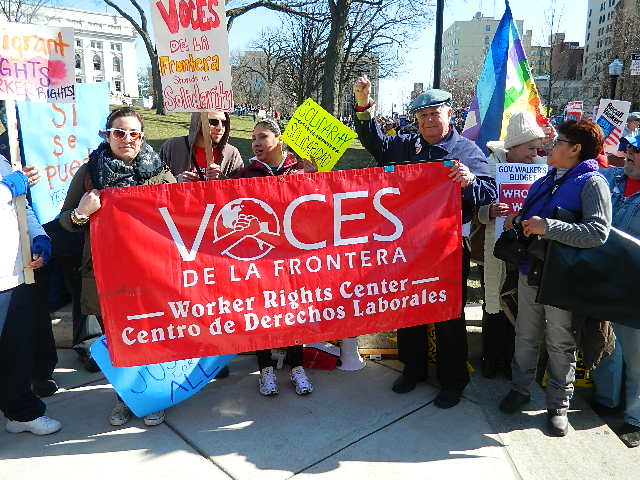Judges Slam Wisconsin GOP for "Needlessly Secret" and "Partisan" Redistricting

A panel of three judges ruled that Latino communities on the Southside of Milwaukee were disenfranchised by the overly partisan maps. The maps for Assembly districts 8 and 9 must be redrawn by the state legislature, which is now split 16-16 in the Wisconsin Senate, or the court will redraw them. However, the judges upheld all the other legislative and Congressional districts that Republicans drew last year stating that even though the maps caused problems for some one million voters and disrupted long-standing political relationships, the resulting population deviations were not large enough to permit judicial intervention under the law.
"This is a vindication that we were right,"said Christine Neumann-Ortiz, the executive director of Voces de la Frontera, of one of the groups challenging the partisan maps. "If the Republican Party had chosen to honor the public process -- instead of operating secretly -- there would have been the opportunity for a meaningful discussion and debate."
Court Shames Wisconsin GOP
In a lengthy and extraordinary opinion, the justices made clear their preference for an open and fair process and took time to excoriate the secret and undemocratic process used by the Republican Party.
As CMD has previously reported, the court was already riled by the "all but shameful attempt to hide the redistricting process from public scrutiny." On February 16, the justices ordered the GOP to disclose emails and other redistricting documents that detailed secret meetings at law firms, written secrecy pledges, the involvement of major lobbying interests, and a complete exclusion of the public and Democratic Party from the process.
In their final ruling the justices began, "there was once a time when Wisconsin was famous for its courtesy and its tradition of good government," and then segued into a long quote from historian James Conant:
The most important feature of Wisconsin's society, government, and politics during the twentieth century was its progressive nature. Wisconsin had a highly developed civil society, its elected and administrative officials continuously attempted to improve the state's political institutions, and they attempted to enhance the economic and social circumstances of the state's citizens. Throughout the century Wisconsin's politics were issue oriented, state government institutions operated free of scandal, and the administration of state policies and programs was conducted efficiently and effectively.
This start to the ruling stood in stark contrast to the revelations that followed.
GOP Pursues "Needlessly Secret" and "Partisan" Process
The unanimous decision was written by three judges, two appointed by Republican presidents and one appointed by Democratic President Bill Clinton. The judges pulled no punches. The three slammed the GOP for a process that was "needlessly secret, regrettably excluding input from the overwhelming majority of Wisconsin citizens."
The judges noted that while there was only one public hearing the map drafters met with certain private business interests behind closed doors, including representatives from realtor and banking associations, and Wisconsin Manufacturers & Commerce. "Regrettably, like many other states, Wisconsin chose a sharply partisan methodology that has cost the state in dollars, time, and civility," the judges wrote. By one estimate the taxpayer's bill for GOP legal fees has already reached $1.3 million.
They slammed the young aides of Majority Leader Scott Fitzgerald and Assembly Speaker Jeff Fitzgerald who asked Republican legislators to sign "confidentiality agreements" promising not to discuss anything that was said during secret redistricting deliberations at a local law firm. One young aide then testified under oath that partisan considerations were not part of their deliberations. "We find those statements to be almost laughable," the judges wrote.
The judges also subtly pointed the way forward. Because of powersharing, the Wisconsin Legislature has not drawn up its own maps since 1972. Unable to develop a bipartisan process, legislators have basically ceded the ground to the courts. But there may be a way out of this partisan morass. The court notes that: "Some states, like Iowa and California, have adopted nonpartisan systems that seem successfully to have overcome this. New York is seriously thinking right now of taking a similar step, and there has been some talk of it in Wisconsin in the wake of this litigation."
Because the grounds under which a court can throw out redistricting maps are very narrow, the vast majority of the maps will stand, unless Republicans and Democrats agree to go back to the drawing board, an unlikely scenario. Already the parties are staking out their positions, with the Democrats urging a new rewrite of all the maps with a greater degree of public input and Republicans advocating for the court to address any problems saying only "one line" needs to be moved on the Southside of Milwaukee.
When the maps are completed, they will be used for 10 years in the state of Wisconsin giving permanent partisan political advantage in many districts to the Republican Party.




